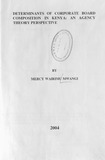| dc.description.abstract | An important aspect of research on corporate governance is the appointment of outside
directors on boards in order to monitor the behavior of management. The purpose of this
research was to seek the factors that determine the board composition as measured by the
proportion of outside directors. The research adopted an agency theory perspective
focusing on the impact of managerial ownership, structure of ownership, leadership
structure of the board and board size.
Our basic methodology consisted of estimating a multivariate regression model. The
dependent variable was the proportion of outside directors. The independent variables
included variables to capture alternative corporate governance mechanisms (inside
ownership, leverage, and ownership concentration), other board characteristics (board size
and CEO duality), and potentially important control variables including company size and
firm performance.
Overall we expected an inverse relationship between representation of outside directors on
boards and alternate agency conflict controlling mechanisms.
The study was tested on 45 companies of the Nairobi stock exchange for the year 1SI April
2002 to 31SI March 2003.
The empirical findings of this study are consistent with the implications of the agency
theory literature. We find that many results are consistent with board composition studies
in considerably more developed countries such as the US and UK where the emphasis on
effective corporate governance and the role of independent outside directors has been part
of the corporate environment for a relatively much longer amount of time. Thus, there is
evidence that many elements of the agency framework as it relates to board composition are
applicable to different economic systems. The findings also reflect that corporate boards in
Kenya are fully embracing the recommendations on good corporate governance as
recommended by the guidelines issued by CMA in 2002 | en |

